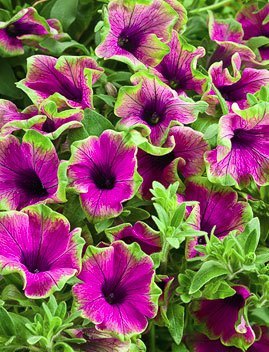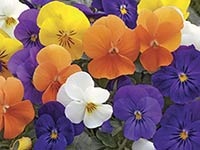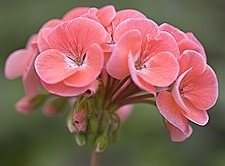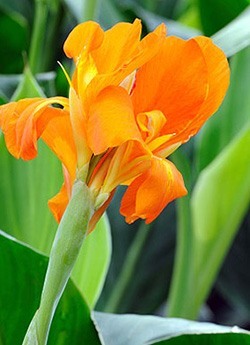
Cosmos are easy-to-grow annual favorites
Annuals are the plant world’s equivalent of a summer romance.
“Live fast and die young” applies here, as these plants move through their life cycle – growing, flowering, setting seed, and dying off – in just one season.
Some plants grown as single-season flowers in colder climates are perennials in warmer regions. Popular bedding and container geraniums (Pelargonium species), for example.
The best way to use these plants in your garden
Modern annual flowers are bred for color through the season, and that makes them great supporting players for perennials.
They are excellent at filling gaps when perennials are still small, and your choice of plants is almost endless.
They also take a starring role in container gardening.
If you’re a beginner gardener, annual flowers are easy to plant and maintain, they’re the best way to get your feet wet learning the tricks of growing things.

Supertunia ®Pretty Much Picasso
Photo: Proven Winners
Three secrets to success with annuals
1. Planting and spacing: Plant transplants closely so they fill in quickly. Usually, the tag will say to plant 8 to 12 inches apart, so pick 8 inches for a great show of flowers more quickly. I actually take a ruler into the garden, or measure off the spacing with my trowel. If the plants are a bit pot-bound (roots circling around), cut an X into the bottom with a knife or use your fingers to tease them apart so they make better contact with soil.
2. Watering: Annuals need water to thrive. Water them deeply two to three times a week after planting. The moist soil will encourage good growth. For the best show of color all summer, don’t let up on the watering.
3. Feed your plants: Once a week, feed your plants with a balanced all-purpose 20-20-20 fertilizer that you mix with water. You’ll find traditional or organic fertilizers – either will do the job. One good organic is fish emulsion, which I like to mix together with a kelp-based fertilizer. Your annuals will grow even better if you mix some compost or manure into your soil before you plant.

Viola or Johnny-jump-up
Sun or shade
Plant tags usually tell you whether a plant prefers sun or shade. Sun means they can take sunshine all day, but they’ll also do well with four to six hours, especially if it’s in the afternoon.
The important part to remember for shade plants is that they will take some sun, but not the strong sun that burns down all afternoon. Morning sun is better for these plants.

Coral geranium love the sun
Summer-flowering bulbs
Not technically annuals, but like annuals, the following summer bulbs must be replanted each season as they’re not hardy in northern regionssd.
Learn more about:
Dahlias – growing and care tips
Gladiola bulbs – how to grow, care guide
More summer-flowering bulbs – acidanthera, begonia, calla and canna lilies, and more
Summer bulbs – how to overwinter them so you replant them next season

Orange-flowering canna lily
ANNUALS WE LOVE
Edible flowers – you can eat pansies, nasturtiums and more
Geraniums beloved and indispensable
Petunias – hot newer varieties
Fall mums perk up late season flower beds and containers
Sweet peas for fragrance and color
Container gardening tips: A great way to grow annuals







